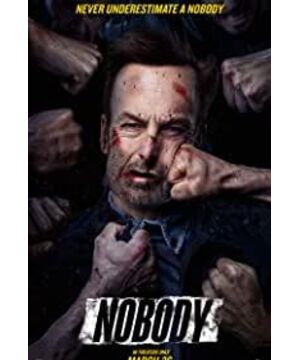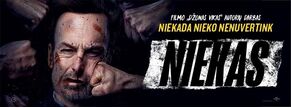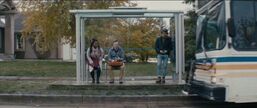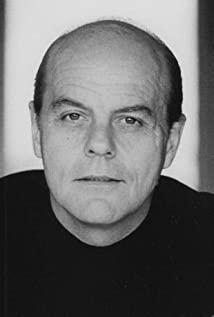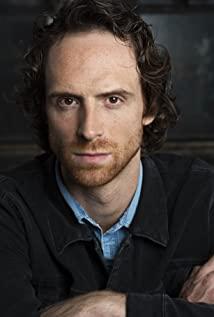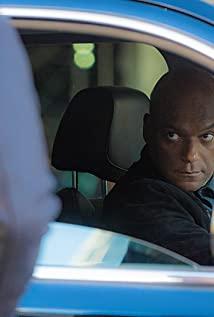This article was originally published in the public account " Rabbit Eyes Watching Movies "
In the interrogation room, in front of the two policemen, the male protagonist Hutch held a cat like a godfather.
At the beginning of the feature film, a montage that goes back and forth from Monday to Friday succinctly explains Hutch’s original life: boring, the same, his wife has a successful career and he is working for the old man, and he still takes the bus to work in middle age. The garbage can't make it, so it can be said to be very useless.
On a seemingly unremarkable Monday night, a pair of masked male and female bandits sneaked into Hutch's house. Because the female thief was holding a gun, Hutch stopped her son who was fighting with the male thief in order to avoid casualties, and let them escape.
Whether it is a neighbor, a family member, or the policeman who came to take the record, although he said he was doing the right thing, he seemed to be condemning him for not being tough enough.
The foreshadowing of the first act of the movie is to illustrate the man's "incompetence". He has always emphasized that he is nobody, not only saying that he is an ordinary person, but also alluding to his lack of masculinity as a man.
But in fact, Hutch is a hidden agent.
It's not that he can't be violent; it's that he doesn't want to and doesn't want to.
Even after the two thieves were finally found, they were so soft-hearted because they had a baby in the house, they could only vent their anger by hammering the wall.
After being stimulated again and again, Hutch finally broke out. Whether the last straw was the gangster he met on the bus or the hair accessory lost by his daughter, it was essentially the masculinity he lost as a man-a "head of the family"-in the eyes of the patriarchal society.
The moment Hutch said I'm gonna fuck you up to the gangsters on the bus, he started a journey to regain his masculinity.
I have to say that the fighting scenes in the film are hearty, bloody and cruel, but beautiful.
This movie comes from the creative team of the "Quick Hunting" series, and the routines are somewhat similar. The difference is that John Wick is a lonely hero, and Hutch's story has always been inseparable from his family. Hutch is easier for the audience to substitute than John Wick, especially men who also feel useless in their lives.
Whether it is the fantasy of abandoning the wretched wife and goddess as in "Charlotte's Troubles", or the fighting and killing all the way like "Little People", they are essentially venting the boredom of the male middle-aged crisis.
The so-called middle-age crisis for men, in the final analysis, is that with the growth of age and experience, men are no longer young and vigorous, so they feel that they have lost a part of their masculinity.
But the so-called "not a man" is actually Hutch's mature and attractive side as a father and husband. In the face of gunmen, he can make rational decisions and minimize the harm to his family. He is infinitely gentle and loving to his little daughter, and calm and patient with his son in the rebellious period. As he drifted away from his wife, he didn't want to cheat, but sought opportunities to repair his relationship. These are far more like the actions of a good man than beating bad guys.
Unfortunately, Hutch is an individual trapped by the patriarchal society. In order to prove that he is not weak, he can only use violence to control violence. This is poisonous masculinity.
Toxic Masculinity (Toxic Masculinity), in essence, is some traditional concepts in today's society that are social and psychologically unfavorable for men. It has the characteristics of hegemony, demeaning women, excessive autonomy, and restraining feelings. In the stereotype of the patriarchal society, men must be aggressive and "masculine."
It drives men’s herd behavior in misogyny, homophobia, and violence, which will be detrimental to others in society. In addition, excessive autonomy and restraint of feelings can easily put men's own psychology under great pressure and hurt themselves.
The trick of "Little People" is that Hutch's so-called midlife crisis is his own choice. He gave up his life of violent killing and wanted to live a normal family life. When an ordinary person's life is too depressing, he can kill the Quartet and regain the trust of his family.
But what about the audience who sympathize with Hutch? They are still trapped in the shackles of the patriarchal society on men, and while hoping to be a good husband and father, they silently endure the crisis of lack of "masculinity".
As an action movie lover, I fully understand the screenwriter’s plot design, and I also admire the role of Hutch created by the movie. After all, to rationalize so many violent acts and make the audience empathize with the brutal protagonist, we must give him a persuasive reason. But like I'm in Why are superheroes always dead wives? As mentioned, persuasive does not mean reasonable.
It seems that it makes sense to let a victim of toxic masculinity fight back in a masculine manner. But this is like the feminist's self-evidence by sending photos to refute "feminists are ugly girls that no one wants," and it falls into the ridiculous logic of the other party. This is probably the most uncomfortable part of the cool film "Little People".
View more about Nobody reviews


